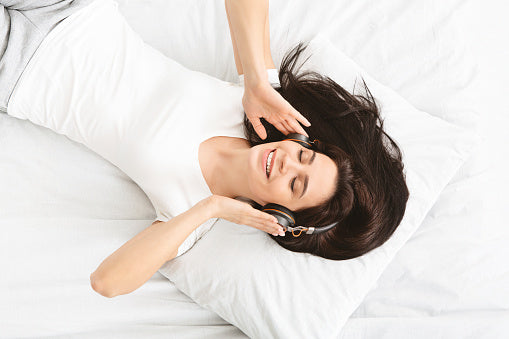Music Therapy for Sleep

Increasingly, relaxing or repetitive music is marketed as “sounds to help you sleep.” At the same time, a therapeutic discipline known as music therapy is gaining credence in medical circles as a means to manage pain and help improve sleep.
What is Music Therapy?
Music therapy, according to the book Defining Music Therapy, is described by National Association for Music Therapy (NAMT) as any techniques that use music to accomplish therapeutic goals: the “restoration, maintenance, and improvement of mental and physical health.” Music and vibrations that may improve sleep can be counted as part of music therapy (especially when used by an experienced music therapist), since sound sleep by definition encourages a healthy, alert mind and body.
Traditional music therapy practice uses a range of musical techniques—from rhythm and dance to music-making to listening to music—usually combined with a discussion of “what happened” during the session, the “meaning” of activity and improvisational music that occurred within the safe space of the therapy room.
Does Music Therapy Work?
Music therapy for children with cancer has been shown to improve well-being and mood in measures taken before and after treatment sessions. The kind of active music therapy described above may indirectly promote healthy sleep through decrease in anxiety and improved mood.
Passive music therapies consisting of calming music played while patients are resting, sedated, or recovering from surgery have been repeatedly shown to improve sleep and minimize recovery times:
- Patients recovering from Coronary Artery Bypass Graft showed significant improvements in sleep and postoperative pain with music therapy, according to a 1996 study.
- A 2003 study found that music therapy, combined with massage and other relaxation treatments, improved sleep patterns and patient outcomes in Intensive Care Units.
- Similar music therapy was found to minimize anxiety levels and noticeably improve sleep patterns for abused women in shelters in a 2005 sleep study, as opposed to a control group.
These studies are only a sample of the work done on music therapy in the last couple of decades. Overall, a wide range of therapeutic music techniques seem to have a measurable impact on sleep, health, and healing.
Author Bio: +Michelle Gordon is a sleep expert who researches and writes about sleep and health, and is an online publisher for the latex mattress specialist Latexmattress.org.


